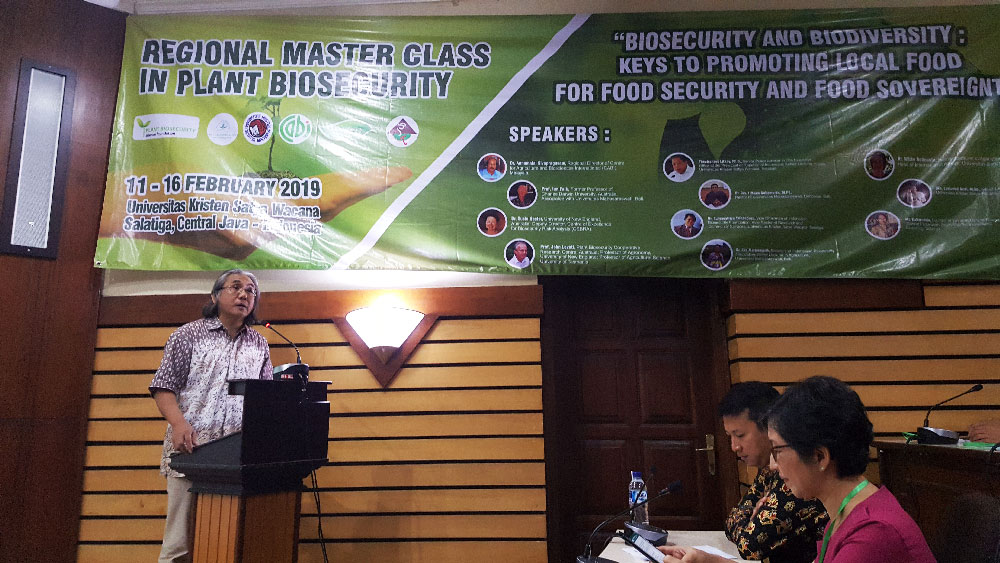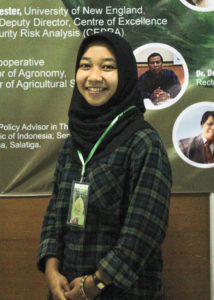

The Importance of Plant Biosecurity
February 5, 2019
The Crawford Fund Regional Master Class in Plant Biosecurity conducted in Salatiga, Central Java, Indonesia from 10-16 February 2019 was hosted by Universitas Kristen Satya Wacana (UKSW) Salatiga, and supported by the Indonesian Biosecurity Foundation (IBF), with assistance from Plant Biosecurity Science Foundation and CABI.
As part of the selection process, participants wishing to join the master class were requested to write an essay on the theme of the program. This week we are highlighting three of these outstanding essays. In this blog we are featuring Agnes Cela Purwani from Semaran, Indonesia and their essay “The Importance of Plant Biosecurity.” Also read essays by Andreas Sukmana and Rohning Sulistyani.

By Agnes Cela Purwani

Agnes at the recent master class.
A few years ago, I travelled to roll out the highest peak of the island of Java. I was interested in the beauty of the lake, and the landscape of the Oro-Oro Ombo savanna which surrounded by purple flowers, which most people thought were lavender flowers. Before I climbed Mount Semeru, me and my team were briefed by the Bromo Tengger Semeru National Park about the climbing SOP. What I guess about lavender flowers was not true, the Bromo Tengger Semeru National Park explained that the flower was a shrub with the scientific name Verbena Brasiliensis Vell. Behind its beauty, Verbena Brasiliensis Vell damages the Bromo Tengger Semeru National Park Ecosystem. The plant grows invasive and absorbs a lot of water, which causes area around the plant to grow dry. This plant cover savanna on Mount Semeru, it led Edelweiss or Anaphalis Javanica and other endemic plants can’t grow in that area. To control the spread of these plants, Bromo Tengger Semeru National Park have harvested the flowers. The National Park also carried out cleaning by removing the plants. Climbers were also encouraged to help pull out the plants, but it is not permitted to bring it down. The origin of the spread of this plant in the Bromo Tengger Semeru National Park is not certain. There are those who say that in the Dutch colonial era, there were Dutch housing in East Java. At that place there was a botanist who often brought plants from abroad, including Verbena Brasiliensiss Vell. The Bromo Tengger Semeru National Park suspects that the plant can grow in the Bromo Tengger Semeru National Park area due to human intervention at that time. This is a small example of plant biosecurity problems that occur in East Java at that time.
The increasing flow of technology, finance, trade, knowledge, people, values, ideas that cross conventional territorial boundaries or what is called globalization, has an impact on a country as a whole. For example, from a macroeconomic perspective, globalization is often interpreted as free trade, which means that in the era of globalization, if a country has ratified a free trade deed of agreement, the country must not prohibit the flow of products from other countries as long as the product or service has superior competitive value or has met the specified standard including agricultural products and comestibles. Food as a basic need to fulfil basic human needs so that they can continue to live, cannot be fulfilled except from agricultural products. At present Indonesia has complex problems, especially in agriculture. Agricultural land is diminishing, as consequences of land conversion. Using chemical fertilizers will aggravating agricultural conditions. Long-term use of chemical fertilizer can change the soil pH, upset beneficial microbial ecosystems, increase pests, and even contribute to the release of greenhouse gases. Similar conditions also occur in Indonesia’s forests. The rise of illegal logging, massive exploitation of forest wealth, and forest conversion for mining and plantation crops such as oil palm, etc., which can damage the forest ecosystem. Indonesia has a tropical forest that holds a unique biological wealth of the world. This condition places Indonesia as one of the countries with the highest biodiversity in the world. Based on FAO data in 2010, the world’s forests including Indonesia’s forests totally store 289 gigatons of carbon and play an important role in maintaining global climate stability. Increasingly severe forest destruction causes disruption of the balance of forest ecosystems and the surrounding environment. A real example of the frequency that is more often occurring is the space conflict between wild animals and humans. The destruction of forest wildlife habitat causes them to compete with humans to get food and living space, which often ends in a loss for both parties. The destruction of forests has become a threat to all living organism.

Biosecurity and biodiversity are closely related to agriculture and forests. Indonesia itself is also vulnerable to the threat of biosecurity, because it imports agricultural seeds or seeds from abroad that contain bacteria, viruses and plant diseases. For example, in the case of shallots in 1997, where imported shallots were consumed which were then misused into seeds. The onion turned out to contain group A1 disease. Until now, the disease continues to attack and become the main enemy of shallot farmers. In 2016, four Chinese nationals were arrested for planting imported chili seeds were stated to be positively infested with a bacterium (erwinia chrysantemi) in Bogor, East Java (Based on the results of laboratory tests published by the local Centre for Agricultural Quarantine Standard Test). Plant Clinic Records, IPB Plant Protection Department, from 1994 until now there have been 12 types of new plant pest organisms identified. This organism is known as Class A1 Quarantine Plant Pest (OPTK) Organism, which is an OPT that has not been found in the country. Reporting from kompas.com page on December 14, 2016, according to Widodo, seeds that carry disease seeds when planted will spread to other plants through water flow, splashes of water, wind, insects, insects, vectors, agricultural equipment and trade in these products. Once a pest or disease enters our country it is very difficult to eliminate it, the inclusion of diseases through seeds was very detrimental. The disadvantage is not only reducing production but harming farmers because it can increase production costs and reduce farmer income. Some uncertainties about the policy implementation for biosecurity remain for future. In order to carefully plan out preventative policies, policy makers need to be able to somewhat predict the probability and assess the risks; however, as the uncertain nature of the biosecurity issue goes it is largely difficult to predict and also involves a complex process as it requires a multidisciplinary approach (Koblentz, 2010). The policy choices they make to address an immediate threat could pose another threat in the future, facing an unintended trade-off. Policy makers are also constantly looking for a more effective way to coordinate international actors- governmental organizations and NGOs- and actors from different nations so that they could tackle the problem of resource overlap (Koblentz, 2010).
Biosecurity for food security in Indonesia has only been developed by agricultural socio-economic experts without involving experts in other fields, such as crop protection. Indonesia’s agricultural policies are short term by focusing on economic considerations. The Ministry of Commerce prefers to import seeds and other agricultural products for reasons more economical than investing funds for agricultural research. Indonesia as a country with abundant natural resources should be balanced by creating superior human resources to be able to process these natural resources with the aim of prosperity for all the people of Indonesia. The role of government is needed as a policy maker and the role of all layers of society in realizing Indonesian food sovereignty.
The Crawford Fund has a number of programs to encourage the next generation in international agriculture for development and the training of international researchers. We are proud to sponsor researchers in biosecurity in Indonesia with thanks to our partners. For further reading on the importance of biosecurity in Indonesia, here are the links to the other two essay submissions: “Local food, food safety and food sovereignty local food,” by Rohning Sulistyani, from the Agriculture Department, Kota Salatiga and “Understanding the Potential of Local Plants in Supporting Food Security: A study case in Salatiga” by Andreas Binar Aji Sukmana, from the Universitas Kristen Satya Wacana (UKSW), Central Java, Indonesia.




